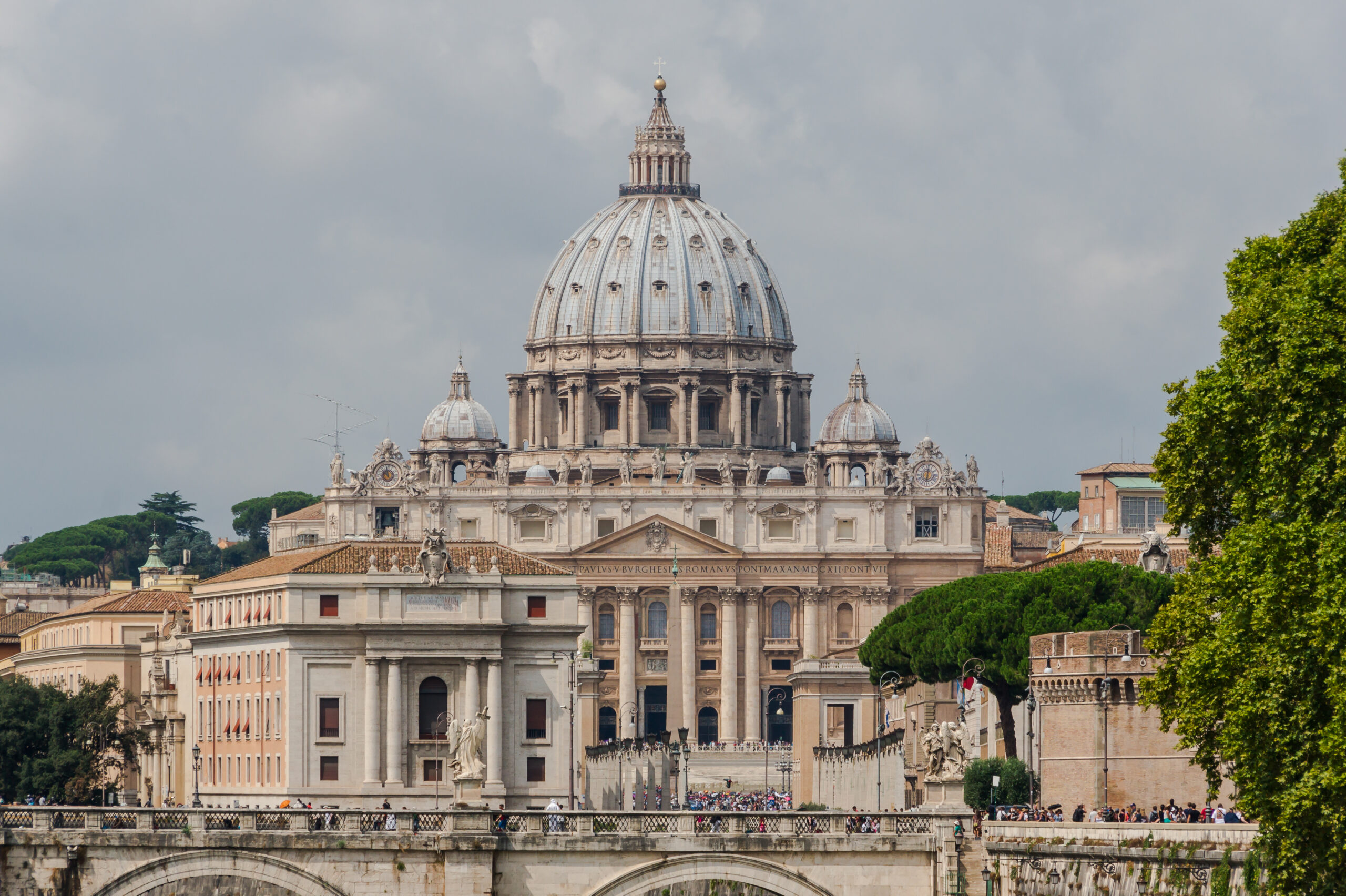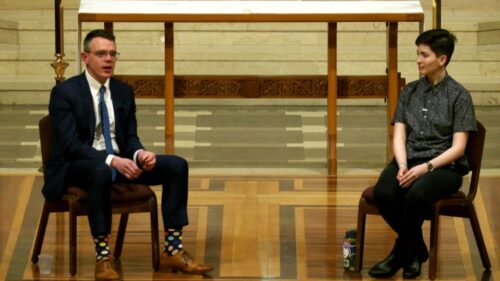The new Outreach ministry comes at a propitious time, when the Catholic Church is engaged in a Vatican-led two-year ministry of listening, otherwise known as synodality. The papal nuncio to the United States (and soon-to-be cardinal), Archbishop Christophe Pierre, recently urged the U.S. Conference of Catholic Bishops to embrace the gift of listening, saying the process is “less about a program and more a way of being church.”
The archbishop’s reference to a “program” is a direct response to some conservative critics who see synodality as a means through which Pope Francis is attempting to change long-established church teachings. Bishop Joseph Strickland of Tyler, Tex., is one such critic, claiming that Pope Francis is “undermining the deposit of faith.”
An essential requirement of listening involves encounter. In today’s polarized atmosphere, it’s easy to avoid those with whom we disagree. Our fractured media permits us to obtain news from sources that often ratify what we believe rather than enlighten us.
Today, Republicans overwhelmingly turn to Fox News as their go-to source for information while many Democrats switch on MSNBC. Our Catholic faith is subject to a similar phenomenon. No longer bound to neighborhood churches, the faithful “church-hop” to find priests and congregations with whom they agree. And in the case of gay Catholics, they seek parishes where they feel welcome and no longer marginalized.
Archbishop Pierre recently urged the U.S.C.C.B. to embrace the gift of listening, saying the process is “less about a program and more a way of being church.”
The creation of the Outreach ministry builds on the decades-long work of many others, particularly that of Sister Jeannine Gramick, S.L., who co-founded New Ways Ministry in 1977. All seek to overcome the long-held stigmas against those who are gay. Those prejudices have a long history.
In the 1950s, the American Psychiatric Association classified homosexuality as a mental disorder. Most Americans agreed. By 1971, 63 percent of respondents thought homosexuality was “harmful” to “the American way of life.” In 1983, 90 percent of respondents in a separate poll said they would be upset if their child was homosexual.
Catholic teaching described homosexual acts as “intrinsically disordered,” a position that aligned with majority opinion at the time. Back then, what people either didn’t know or refused to acknowledge, they failed to understand.
Today, there has been an overwhelming shift of public opinion. Gallup finds that 71 percent of Americans support gay marriage—a record high. June is Pride Month, and many businesses provide supportive environments for their gay employees and customers. This is more than mere altruism. For decades, members of the Fortune 500 gave the partners of their gay employees’ healthcare benefits long before gay marriage became legal.
Their reasoning was simple: companies want to hire the best people. Said one C.E.O. in 2006: “Wherever the talent is coming from, we want that.”
Younger Americans are leading the way in the revolution of public attitudes toward gay people. Eighty-nine percent of adults under 30 support gay marriage. Moreover, they identify themselves as homosexuals earlier than prior generations, and use pronouns as a part of their social media profiles. For them, staying in the closet has become passé.
As Pope Francis has stated, synodality involves three Christ-like traits: encountering, listening and discerning.
As the number of gay identifiers grows—now estimated to be 20 percent of Gen Zers—more Americans know someone who is gay, making attacks on homosexuals a personal issue. In 2016, 87 percent said they knew someone who is gay or lesbian, a number that is surely higher today. Moreover, 69 percent say society has either gone “not far enough” or has it “about right” when it comes to accepting people who are gay, lesbian or bisexual.
Reports from the field find that many Catholic parishioners have identified the church’s position on homosexuality and the exclusion of homosexuals from their pews to be deeply troubling. For example, the synod report from the Archdiocese of Washington, D.C., states:
Persons who identity as LGBTQ+ were mentioned regularly as to the need to be more welcoming and affirming of the gifts these communities bring to the Church. …The request was for greater inclusion of these Catholics in the life of the Church and for greater accompaniment for them and their families.
As one gay Catholic recently told the Washington Post: “I felt deeply convinced that I wasn’t supposed to leave the church, you know? But I was like, ‘Where is my place?’”
Synodality is an invitation to welcome those on the margins of society. Many homosexual Catholics grieve the lack of acceptance from a church they love but often find unwelcoming.
In a keynote address at the Outreach LGBTQ Catholic Ministry Conference this year, Tania Tetlow, the President of Fordham University, said, “To marginalize is a sin.” While some marginalized LGBTQ people have left the Catholic Church altogether, others have found more welcoming parishes. As more people openly confess their sexual orientation and the rest of us come to know them, we are learning that being gay isn’t a choice. No one really chooses to be gay. And why would they?
As more people openly confess their sexual orientation and the rest of us come to know them, we are learning that being gay isn’t a choice. No one really chooses to be gay. And why would they?
For all the progress after years of discrimination, there are those who would still turn a gay child out of their home and send them onto the street, or not hire them for a job or turn away their business. Gay teachers, for example, have been fired from Catholic schools. Recently, we have seen Target, Bud Light and other companies become conservative targets either for selling gay-themed merchandise or hiring spokespersons encouraging acceptance and tolerance.
And for the first time in its history, the Human Rights Campaign has declared a national “state of emergency” for LGBTQ people in the United States.
Every major societal transformation has been met with a backlash of one form or another. The freeing of the slaves after the Civil War led to the creation of the Ku Klux Klan and the lynching of African-Americans. The Irish migration of the 19th century prompted many businesses to post signs reading, “No Irish Need Apply.” The large migration from eastern, central and southern Europe led to the passage of laws restricting immigration from those countries.
Today’s Hispanic migration has produced its own fevered reaction, including the round up of unsuspecting immigrants by hostile governors who then airlift them to other states. In each case, the cruelty was condoned by sizable segments of the public. Change, when it comes, sometimes happens too slowly. Only in 2022, for example, did Congress finally outlaw lynching.
As Pope Francis has stated, synodality involves three Christ-like traits: encountering, listening and discerning. With the process nearing an end, Archbishop Pierre asks, “What old ways need to be abandoned? And what new ways must be adopted going forward? Are we prepared to give our people the insights we have gained?”
Answers to these questions require encountering, listening, and discerning. Pope Francis put it this way: “Synodality is a style, it is a walk together and it is what the Lord expects from the Church of the third millennium.”
Francis’s pontificate represents a time of mercy, synodality and grace. The pope himself has likened the church to a “field hospital” that heals the wounded and warms the hearts of the faithful. Why, for some Catholics, is treating its gay patients so hard?




